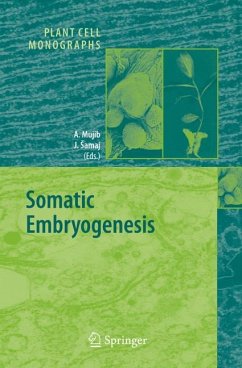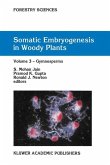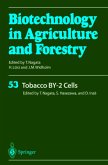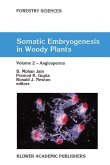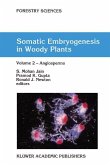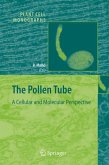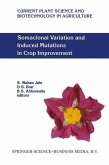- Gebundenes Buch
- Merkliste
- Auf die Merkliste
- Bewerten Bewerten
- Teilen
- Produkt teilen
- Produkterinnerung
- Produkterinnerung
Somatic embryogenesis, the initiation of embryos from previously differentiated somatic cells, is a unique process in plants. This volume expands our view of a subject that is important for plant biotechnology, genetics, cell biology, development, and agricultural applications. All chapters present the latest research progress, including functional genomic, genetic, and proteomic approaches. A special focus is placed on the effects of stress, environment, and plant growth regulators on embryogenesis. The role of genes such as Leafy Cotyledons and Baby Boom in defining and maintaining cell competence is discussed. …mehr
Andere Kunden interessierten sich auch für
![Somatic Embryogenesis in Woody Plants Somatic Embryogenesis in Woody Plants]() Shri Mohan S.M. Jain / Pramod P.K. Gupta / R.J. Newton (eds.)Somatic Embryogenesis in Woody Plants226,99 €
Shri Mohan S.M. Jain / Pramod P.K. Gupta / R.J. Newton (eds.)Somatic Embryogenesis in Woody Plants226,99 €![Tobacco BY-2 Cells Tobacco BY-2 Cells]() Toshiyuki Nagata / Seiichiro Hasezawa / Dirk Inzé (eds.)Tobacco BY-2 Cells161,99 €
Toshiyuki Nagata / Seiichiro Hasezawa / Dirk Inzé (eds.)Tobacco BY-2 Cells161,99 €![Somatic Embryogenesis in Woody Plants Somatic Embryogenesis in Woody Plants]() Somatic Embryogenesis in Woody Plants161,99 €
Somatic Embryogenesis in Woody Plants161,99 €![Somatic Embryogenesis in Woody Plants Somatic Embryogenesis in Woody Plants]() Shri Mohan S.M. Jain / Pramod P.K. Gupta / R.J. Newton (Hgg.)Somatic Embryogenesis in Woody Plants161,99 €
Shri Mohan S.M. Jain / Pramod P.K. Gupta / R.J. Newton (Hgg.)Somatic Embryogenesis in Woody Plants161,99 €![Tobacco BY-2 Cells: From Cellular Dynamics to Omics Tobacco BY-2 Cells: From Cellular Dynamics to Omics]() T. Nagata / K. Matsuoka / D. InzéTobacco BY-2 Cells: From Cellular Dynamics to Omics161,99 €
T. Nagata / K. Matsuoka / D. InzéTobacco BY-2 Cells: From Cellular Dynamics to Omics161,99 €![The Pollen Tube The Pollen Tube]() Rui Malhó (ed.)The Pollen Tube121,99 €
Rui Malhó (ed.)The Pollen Tube121,99 €![Somaclonal Variation and Induced Mutations in Crop Improvement Somaclonal Variation and Induced Mutations in Crop Improvement]() Somaclonal Variation and Induced Mutations in Crop Improvement231,99 €
Somaclonal Variation and Induced Mutations in Crop Improvement231,99 €-
-
-
Somatic embryogenesis, the initiation of embryos from previously differentiated somatic cells, is a unique process in plants. This volume expands our view of a subject that is important for plant biotechnology, genetics, cell biology, development, and agricultural applications. All chapters present the latest research progress, including functional genomic, genetic, and proteomic approaches. A special focus is placed on the effects of stress, environment, and plant growth regulators on embryogenesis. The role of genes such as Leafy Cotyledons and Baby Boom in defining and maintaining cell competence is discussed.
Hinweis: Dieser Artikel kann nur an eine deutsche Lieferadresse ausgeliefert werden.
Hinweis: Dieser Artikel kann nur an eine deutsche Lieferadresse ausgeliefert werden.
Produktdetails
- Produktdetails
- Plant Cell Monographs 2
- Verlag: Springer / Springer Berlin Heidelberg / Springer, Berlin
- Artikelnr. des Verlages: 978-3-540-28717-9
- 2006
- Seitenzahl: 372
- Erscheinungstermin: 22. Februar 2006
- Englisch
- Abmessung: 241mm x 160mm x 28mm
- Gewicht: 754g
- ISBN-13: 9783540287179
- ISBN-10: 3540287175
- Artikelnr.: 15197738
- Herstellerkennzeichnung Die Herstellerinformationen sind derzeit nicht verfügbar.
- Plant Cell Monographs 2
- Verlag: Springer / Springer Berlin Heidelberg / Springer, Berlin
- Artikelnr. des Verlages: 978-3-540-28717-9
- 2006
- Seitenzahl: 372
- Erscheinungstermin: 22. Februar 2006
- Englisch
- Abmessung: 241mm x 160mm x 28mm
- Gewicht: 754g
- ISBN-13: 9783540287179
- ISBN-10: 3540287175
- Artikelnr.: 15197738
- Herstellerkennzeichnung Die Herstellerinformationen sind derzeit nicht verfügbar.
A. Mujib is senior lecturer at the Department of Botany, Hamdard University, New Delhi, India. He received his Ph.D. degree from the University of Kalyani (India) working on in vitro studies of bulbous ornamentals. Later he was appointed to a position in the Department of Chemical Engineering, Indian Institute of Technology (IIT), Kharagpur. He teaches molecular genetics, cytogenetics, and plant biotechnology. His current research interests include somatic embryogenesis and gene expression, analysis of somaclonal variants with a focus on transposons, and in vitro mutagenesis using cell culture as a system. His scientific work has resulted in more than 55 publications including research papers, review articles, and book chapters. Jozef amaj received his Ph.D. degree from the Comenius University in Bratislava, Slovakia. He completed three post-doctoral programmes supported by Eurosilva, the Alexander von Humboldt Foundation, and the EU Marie Curie Programme in well-recognized laboratories in Toulouse, Bonn, and Vienna. His scientific work has focused on the cell biology of somatic embryogenesis, lignification in tree species, arabinogalactan proteins, the cytoskeleton, and signalling proteins. Jozef amaj has co-authored more than 60 research papers, reviews, and book chapters. Currently he is a senior lecturer and associate researcher at the Institute of Cellular and Molecular Botany in Bonn, Germany. His main research interest centers on the role of stress-induced MAP-kinase cascades in relation to vesicular trafficking and the cytoskeleton during stress responses in Arabidopsis thaliana.
Storage Proteins and Peroxidase Activity During Zygotic and Somatic Embryogenesis of Firs (Abies sp.).- Origin, Development and Structure of Somatic Embryos in Selected Bulbous Ornamentals: BAP as Inducer.-Environmental Design Considerations for Somatic Embryogenesis.- Importance of Cytoskeleton and Cell Wall in Somatic Embryogenesis.- Comparison of Molecular Mechanisms of Somatic and Zygotic Embryogenesis.- Genome-Wide Expression Analysis of Genes Involved in Somatic Embryogenesis.- Why somatic Plant Cells Start to Form Embryos?.- Participation of Plant Hormones in Determination and Progression of Somatic Embryogenesis.- Somatic Embryogenesis of Pine Species: From Functional Genomics to Plantation Forestry.- Somatic Embryogenesis in Pinus nigra Arn.: Some Physiological, Structural and Molecular Aspects.- Mode of Action of Plant Hormones and Plant Growth Regulators During Induction of Somatic Embryogenesis: Molecular Aspects.- Somatic Embryogenesis in Chestnut.- Somatic Embryogenesis in Cryptomeria japonica D. Don: Gene for Phytosulfokine (PSK) Precursor.- Protein Markers for Somatic Embryogenesis.- Cytological, Physiological and Biochemical Aspects of Somatic Embryo Formation in Flax.- Somatic Embryogenesis in Rose: Gene Expression and Genetic Transformation.- Embryogenesis in Catharanthus roseus: Roles of Some External Factors in Proliferation, Maturation and Germination of Embryos.- Somatic and Zygotic Embryogenesis in Avocado.- Somatic Embryogenesis in Genera Medicago: an overview.- Differential Gene Expression During Somatic Embryogenesis.- Gametic Embryogenesis in Triticum: a Study of Some Critical Factors in Haploid(Microspore) Embryogenesis.- In vitro culture of Arabidopsis embryos
Storage Proteins and Peroxidase Activity During Zygotic and Somatic Embryogenesis of Firs (Abies sp.).- Origin, Development and Structure of Somatic Embryos in Selected Bulbous Ornamentals: BAP as Inducer.-Environmental Design Considerations for Somatic Embryogenesis.- Importance of Cytoskeleton and Cell Wall in Somatic Embryogenesis.- Comparison of Molecular Mechanisms of Somatic and Zygotic Embryogenesis.- Genome-Wide Expression Analysis of Genes Involved in Somatic Embryogenesis.- Why somatic Plant Cells Start to Form Embryos?.- Participation of Plant Hormones in Determination and Progression of Somatic Embryogenesis.- Somatic Embryogenesis of Pine Species: From Functional Genomics to Plantation Forestry.- Somatic Embryogenesis in Pinus nigra Arn.: Some Physiological, Structural and Molecular Aspects.- Mode of Action of Plant Hormones and Plant Growth Regulators During Induction of Somatic Embryogenesis: Molecular Aspects.- Somatic Embryogenesis in Chestnut.- Somatic Embryogenesis in Cryptomeria japonica D. Don: Gene for Phytosulfokine (PSK) Precursor.- Protein Markers for Somatic Embryogenesis.- Cytological, Physiological and Biochemical Aspects of Somatic Embryo Formation in Flax.- Somatic Embryogenesis in Rose: Gene Expression and Genetic Transformation.- Embryogenesis in Catharanthus roseus: Roles of Some External Factors in Proliferation, Maturation and Germination of Embryos.- Somatic and Zygotic Embryogenesis in Avocado.- Somatic Embryogenesis in Genera Medicago: an overview.- Differential Gene Expression During Somatic Embryogenesis.- Gametic Embryogenesis in Triticum: a Study of Some Critical Factors in Haploid(Microspore) Embryogenesis.- In vitro culture of Arabidopsis embryos

